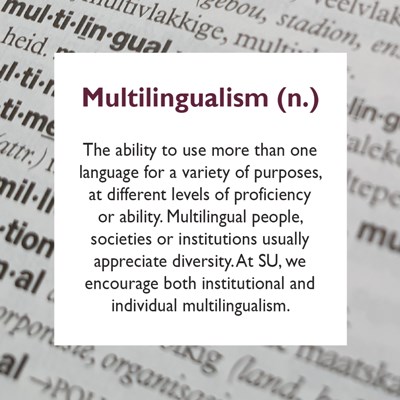 It is about giving people a voice, regardless of the language(s) they use. It is about recognising the value of what is said, no matter what language is used, and whether it is said in English, Afrikaans, isiXhosa or South African Sign Language. It talks to our diversity as a country – and allows us to connect in ways we otherwise could not. Multilingualism is therefore also an attitude.
It is about giving people a voice, regardless of the language(s) they use. It is about recognising the value of what is said, no matter what language is used, and whether it is said in English, Afrikaans, isiXhosa or South African Sign Language. It talks to our diversity as a country – and allows us to connect in ways we otherwise could not. Multilingualism is therefore also an attitude.
Our focus at SU is not only on institutional multilingualism, but also on individual multilingualism. In other words, we do not focus only on establishing multilingual spaces at the University (through translation and interpreting, for example) where a diverse group of monolingual people co-exist, but we actively encourage people to use more than one language, even if they can say and understand only a little in some of those languages.
Individual multilingualism is an asset that we would like to develop because of the clear academic advantages this presents, both nationally and internationally. Creating opportunities for individual multilingualism allows people to develop their ability to use languages or varieties of languages in different forms and at different levels of mastery. If you have ever tried to learn a new language, you will know that the learning experience can transform your life. As your experience of a language in its cultural context expands, you will find that you do not keep these languages and cultures in strictly separated mental compartments, but rather build up a communicative, plurilingual competence or ability to which all your knowledge and experience of language contribute, and in which languages interrelate and interact.
Translanguaging in the classroom is one such plurilingual practice or behaviour. While it is important to create space for students to use tools such as translanguaging to communicate informally in the classroom, there is also a need for students to study language(s) formally and use the academic and technical registers of these languages.
Read this article in Afrikaans | isiXhosa